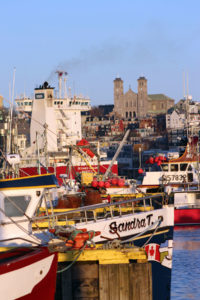Touring provides us with an opportunity to meet some extraordinary characters and participate in many ridiculous adventures, but nothing compares to the recent trip we hosted in an autonomously driven vehicle provided by one of the world’s largest automobile manufacturers.
Scary?
Supposedly. But nothing like the convoluted story it evoked this Halloween when we met a fellow outside our downtown apartment dressed like a woman (along with five of his buddies in raggedy workman’s outfits), pretending to recreate Sir Richard Squires (Prime Minister of Newfoundland) flight from the Colonial Building in 1932. Running for his life with a mob of 10,000 angry Newfoundlanders chasing his tail, he supposedly ducked into an alleyway off Bannerman Street where sympathizers disguised him in women’s clothing to aid his escape.

“… running for his life…”
It was a great costume and it might have seemed comical if not for the fact that that was also a time of major “Technological Disruption” and Newfoundland was on the verge of financial ruin. Within two years this country was declared insolvent, with our democratically elected government replaced by a ‘Commission’ made up of representatives appointed by England.
No laughing matter, but one that is easily explained, along with some valuable insights to our future and the opportunities ahead.
Near the end of the 20th century, Newfoundland embarked on a ridiculous railroad project, finishing it pretty much on the same date that Henry Ford began mass producing automobiles. A useless endeavour that was little more than a vanity project, built only to bolster Newfoundland’s status as a “Real” country, proving we were every bit as strong and capable as our colonial rivals in Canada, Australia and New Zealand.
It cost fortunes, and since we lived on an island with an established network of coastal boats to pick up and deliver our only export staple (fish), this railway went nowhere and carried nothing. There was no way to effectively collect revenues to offset the construction cost, so the burden was placed directly on the back of the colony and its tax paying citizens.

“… assumed an enormous debt…”
Additionally, Newfoundland assumed an enormous debt during the First World War (which it repaid promptly), and as well, sent and lost more men than any other member of the British Empire. For a country that relied entirely on the extraction of primary resources, the annihilation of the work force drastically affected the island’s economic generators.
Of course, all this came at the least opportune time, when the entire planet reeled from the stock market crash in New York and the ‘Great Depression’.
Make no wonder the people of Newfoundland were frustrated. But they needn’t have been, not if we were forward enough in our thinking to recognize the opportunities that still lay ahead.

“… recognize the opportunities…”
Thanks to Robert Stone’s book, ‘A Gentlemen’s Agreement’, we now have a far better appreciation of Newfoundland’s aviation history, most particularly the internationally coveted landing rights and airspace we controlled during the dawn of transatlantic passenger flights. Rights which Sir Richard Squires carried in his breast pocket as he raced away from that angry mob in 1932; frustrated by threats to their livelihood and the jobs they’d held for centuries.
Squires recognized the value in those papers and he might have stopped that crowd dead in their tracks had he explained the real future we should have enjoyed as a country. Instead he scurried away in fear, thinking nothing would appease the crowd, nor save Newfoundland from economic ruin.

“… he was right to run…”
In many ways he was right to run. Despite all the automation and computerized technology in today’s world, we’re still having a hard time accepting the concept of self driven automobiles and its mass introduction over the next 5 years. Can you imagine how difficult it would be to convince people that planes would soon be carrying passengers on scheduled flights across the Atlantic Ocean?
“Disruptors” certainly bring a whole new meaning to the concept of;
“Trick or Treat”

